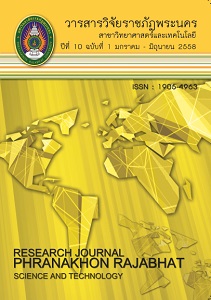ผลของโปรแกรมการส่งเสริมสุขภาพผู้ป่วยเบาหวานตามปรัชญาเศรษฐกิจพอเพียง ตำบลฟากห้วย อำเภออรัญประเทศ จังหวัดสระแก้ว
Keywords:
ผู้ป่วยเบาหวาน, แบบแผนความเชื่อ, ด้านสุขภาพ, ปรัชญาเศรษฐกิจพอเพียง, Diabetes patients, Health promotion program, Health Belief Model, Sufficiency EconomyAbstract
การวิจัยแบบกึ่งทดลองนี้มีวัตถุประสงค์ เพื่อศึกษาประสิทธิผลของโปรแกรมส่งเสริม สุขภาพ สำหรับผู้ป่วยเบาหวานตามปรัชญา ฃเศรษฐกิจพอเพียง ในด้านความรู้เกี่ยวโรคเบาหวาน การรับรู้ในโอกาสเสี่ยงของการเป็นโรคเบาหวานความรุนแรงของโรค ประโยชน์ และอุปสรรคของการปฏิบัติตัวในการรักษา
และป้องกันโรคเบาหวาน และพฤติกรรมสุขภาพของผู้ป่วยเบาหวานด้านการรับประทานอาหาร การออกกำลังกาย และการใช้ยากลุ่มตัวอย่าง คือผู้ป่วยเบาหวานชนิดที่ 2 ที่ไม่สามารถควบคุมระดับน้ำตาลได้ ในเขตตำบล ฟากห้วย อำเภออรัญประเทศ จังหวัดสระแก้ว จำนวน 70 คน แบ่งเป็นกลุ่มทดลอง และกลุ่มควบคุม กลุ่มละ 35 คน กลุ่มทดลองได้รับโปรแกรมการส่งเสริมสุขภาพสำหรับผู้ป่วยเบาหวาน ที่ประยุกต์ใช้แบบแผนความเชื่อด้านสุขภาพ และแนวคิดปรัชญาเศรษฐกิจพอเพียง 3 ประการ คือ ความพอประมาณความมีเหตุผลและความมีภูมิคุ้มกัน การออกแบบกิจกรรมส่งเสริมความรู้เกี่ยวกับสุขภาพที่ดีของผู้ป่วยเบาหวาน ระยะเวลาดำเนินการทดลอง 12 สัปดาห์ สถิติที่ใช้ใน การวิเคราะห์ข้อมูล ได้แก่ ร้อยละ ค่าเฉลี่ย ส่วนเบี่ยงเบนมาตรฐาน Paired samples t-test และ Independent t-test ผลการวิจัยพบว่า ภายหลังเข้าร่วมโปรแกรมการส่งเสริมสุขภาพสำหรับผู้ป่วยเบาหวานตามปรัชญาเศรษฐกิจพอเพียง กลุ่มทดลองมีผลการศึกษาระดับสูงในด้านระดับความรู้เกี่ยวกับโรคเบาหวานดีขึ้นอยู่ในระดับสูง (ค่าเฉลี่ย 17.80) มีการรับรู้โอกาสเสี่ยงของการเกิดโรค (ค่าเฉลี่ย 38.09) การรับรู้ความรุนแรงของโรค (ค่าเฉลี่ย 45.74) และการรับรู้ประโยชน์ของการรักษา และป้องกันโรคอยู่ในระดับมากที่สุด (ค่าเฉลี่ย 42.51) ส่วนการรับรู้อุปสรรคของการปฏิบัติตัวในการรักษา และการป้องกันโรคเบาหวานอยู่ในระดับมาก (ค่าเฉลี่ย 36.09) และพฤติกรรมสุขภาพของผู้ป่วยเบาหวานด้านการรับประทานอาหารการออกกำลังกาย และการใช้ยาอยู่ในระดับมาก (ค่าเฉลี่ย 79.46) เมื่อพิจารณานัยสำคัญทางสถิติภายหลังการทดลอง พบว่ากลุ่มทดลองมีคะแนนเฉลี่ยสูงกว่าก่อนการทดลองและสูงกว่ากลุ่มควบคุมอย่างมีนัยสำคัญทางสถิติที่ระดับ 0.05ยกเว้นด้านความรู้เกี่ยวกับโรคเบาหวาน และการรับรู้อุปสรรคของการปฏิบัติตัวที่ไม่พบนัยสำคัญทางสถิติที่ระดับ .05ผลการศึกษาแสดงให้เห็นว่าโปรแกรมการส่งเสริมสุขภาพสำหรับผู้ป่วยเบาหวานตามแนวคิดเศรษฐกิจพอเพียง ทำให้ผู้ป่วยเบาหวานมีความรู้ การรับรู้ และพฤติกรรมการปฏิบัติตัวในการดูแลสุขภาพเกี่ยวกับโรคเบาหวานดีขึ้น กิจกรรมตามโปรแกรมนี้สามารถนำไปประยุกต์ในพื้นที่ตำบลอื่น ๆ ได้
THE EFFECT OF HEALTH PROMOTING PROGRAM ACCORDING TO SUFFICENCY ECONOMY PHILOSOPHY FOR DIABETES PATIENTS, TUMBOL FAKHUA, ARANYAPRATHET DISTRICT, SAKAEO PROVINCE
This quasi - experimental research aims to assess the effectiveness of health promotion program for diabetic patients, according to the sufficiency economy, philosophy regarding knowledge of diabetic ; perceived susceptibility to severity from diabetes and perceived cost - benefit in diabetes treatment and prevention practices ; and health behaviors on diet, exercise, and medication. The study samples comprised of 70 Type 2 diabetic patients, who could not control blood sugar and have been living in Fakhua sub-district, Aranyaprathet, Sakaeo province. They were equally assigned into an experimental group and a comparison group. The experimental group received a health promotion program for diabetic patients that Health Belief Model and 3 concepts of sufficiency economy philosophy namely moderation, reasonableness, and immunity were devised to design the studied program activities. The activities aimed to enhance knowledge of diabetes, perception of susceptibility, severity, and cost-benefit in diabetic practices; and to promote practices of the diabetic patients to build good health immunes. The experiment duration lasted 12 weeks. Diabetic knowledge test, self -administered questionnaire about perception and health behaviors were used to collect data. Data were analyzed by percent, mean, standard deviation, aired samples t - test, and Independent t - test. Results of the study revealed that, after participating the health promotion program, the experimental group had a high level of knowledge of diabetes (X¯=17.80), a very good level in the perception on susceptibility (X¯=38.09), severity (X¯=45.74), and benefit in treatment and prevention of diabetes (X¯=42.51). While they were in a good level of perceived barriers (X¯=36.09) and health practices about diet exercises and medications (X¯=79.46). Then after experimental program, mean score had significantly at p<. 05 except mean of knowledge of diabetes and perceived barriers in performing health behaviors wasn’t significant at p<0.05 The study results indicated that the health promotion program for diabetic patients, according to sufficiency economy, philosophy can enhance the better knowledge, perceptions, and practices in diabetic self health care. Therefore, this program can be applied in other sub-district areas.
Downloads
Issue
Section
License
โปรดกรอกเอกสารและลงนาม "หนังสือรับรองให้ตีพิมพ์บทความในวารสารวิจัยมหาวิทยาลัยราชภัฏพระนคร สาขาวิทยาศาสตร์และเทคโนโลยี" ก่อนการตีพิมพ์




